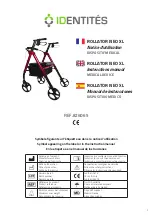
E
SQUOD_SU
06/2009
9
STANDING/UPRIGHT FUNCTION
To use the standing/upright function, you must always ensure beforehand that the legs are made
secure with the knee brackets and the upper body likewise with the chest belt (see descriptions in the
relevant sections, "Leg support" and "Chest belt").
L
The standing/upright function must only ever be used when another person is supervising.
L
The standing/upright function may not be used without the chest belt and knee protector being
secured - this would be done at your own risk.
L
The manufacturer accepts no liability for use of the standing/upright function without the chest
belt and knee protector .
L
The standing/upright function may only be used if all four of the wheelchair's wheels are in
contact with a level surface (and while being used on the two front wheels).
L
Make sure that no objects, persons or body parts are inside the movement range of the
upright function, since this could cause damage or injury.
L
Ensure that the steering cables do not get caught during the upright function, as this could
damage the product.
Follow this sequence when using the standing/upright function:
1.
Adjust to the position you want.
2.
Ensure that the wheelchair is stable. If necessary move it to the position you want.
3.
Switch off the drive electronics.
4.
Deploy the knee protector (or have it deployed for you).
5.
Check that the feet are resting flat on the footplate.
6.
Deploy the chest belt (or have it deployed for you).
7.
Check whether the arm rests are folded down.
8.
Switch on the drive electronics and select the adjust function for the upright function.
9.
Pull the joystick backwards or push it forwards to carry out the relevant function.
Bear in mind that, when the upright function is
in use, the wheelchair rests on the front rollers
beneath the footplate and the steering wheels
(200x85) lift about 1 cm from the ground. To
change direction, the wheelchair is then
moved using the rollers and the drive wheels.
There is only limited drive functionality.
L
Only loosen the chest belt and the
knee protector again when the
wheelchair has been returned to the
seated position.
L
The standing/upright function must
only ever be used when another
person is supervising
L
The standing/upright function may not
be used without the chest belt and
knee protector being secured - this
would be done at your own risk.
L
The manufacturer accepts no liability for use of the standing/upright function without the chest
belt and knee protector .
L
The standing/upright function may only be used if all four of the wheelchair's wheels are in
contact with a level surface (and while being used on the two front wheels).
L
L
L












































